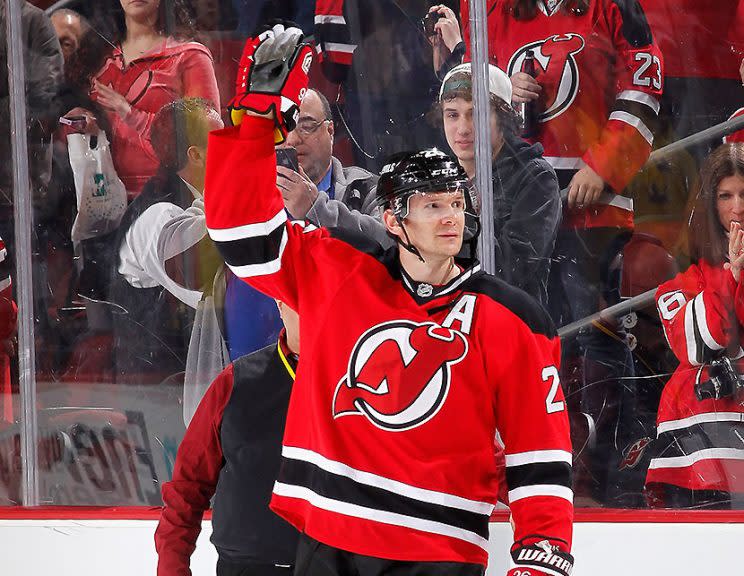Appreciating Patrik Elias, the constant Devil

As a New Jersey Devils fan, it took me a while to “get” Patrik Elias.
I got Scott Stevens. He anchored the blueline and wore the captaincy over his heart and tried to remove opponents from their heads. I got Scott Niedermayer. He was fast and effortless and had endless potential. And of course I got Martin Brodeur.
I got that watching these players meant watching legends being written in real-time. And I got Ken Daneyko, because he was Mr. Devil and had been with the franchise almost as long as I had been alive.
But unlike those guys, I didn’t really get Patrik Elias.
I thought he was a solid complementary player. His breakout offensive year in 1999-2000 was as a member of a breakout offensive line: The A-Line, with Jason Arnott and Petr Sykora. He scored twice to complete their Eastern Conference Final rally against the Philadelphia Flyers. The defining moment of his Devils career arrived in the Stanley Cup Final, with this immaculate pass to Arnott for the championship win in double overtime:
Then he hit 40 goals in 2000-01 with the A-Line. Watching a Devils player scoring 75 goals in a two-year span was unheard of. And yet, at the time, it was less about Elias for me than it was the achievement of his line, in total.
I’d see people at games wearing Elias jerseys instead of Stevens or Brodeur, and I wouldn’t get it. Four-time all-star, but only once on the postseason team. No individual awards – the best he did was sixth for the Hart in 2001. Never leading the League in any category.
Scott Gomez resonated with me. So did Alex Mogilny, so did Zach Parise, so did Ilya Kovachuk. Elias was … Elias. He was there for 74-82 games, there for 20 goals and better than 60 points, there in the playoffs where he had 125 points in 162 games.
Not a legend, just really good. Not a breakout star, but a constant.
Then, on March 17, 2009, I finally got it.
That I had taken him for granted.
That’s when Elias scored career point No. 702, passing John MacLean to become the Devils’ all-time leading scorer. He did it, appropriately, as a playmaker – brilliantly controlling the puck and creating a chance for Brian Gionta. The same Brian Gionta that starred with Elias and Gomez on the EGG Line, the other dynamic trio with whom Elias skated.
You might remember Gionta setting a franchise record with 48 goals in 2005-06; you might not remember Elias returning from a battle with Hepatitis A that season, which he contracted in Russia during the lockout, scoring 45 points in 38 games when he returned in January.
Gionta got the headlines. Elias was Elias.
As he officially retires from the NHL, here’s what everyone should get about Patrik Elias: No one scored more goals with the Devils (408) or set-up other players’ goals with the Devils (617). No one is going to touch Elias’s franchise record in points (1,025), perhaps for decades. No forward played more games than Elias (1,240). No one scored more power-play goals (113) or had more game-winning goals (80) or took more shots (3,287) or had more hat tricks (8). Much of this was accomplished in a dead-puck era, and playing the entirety of his career with a franchise that wasn’t exactly a bastion of offensive juggernauts.
[Follow Puck Daddy on social media: Twitter | Instagram | Facebook | Tumblr]
Dan Rosen of NHL.com, who has covered the Devils for years, thinks that Elias is a Hockey Hall of Famer, given the standards of the current selection committee.
“I don’t think there is a question about it. It should not be up for debate,” he wrote.
The best modern comparison is a player many expect will be enshrined: Daniel Alfredsson, who had 444 goals and 713 assists in 1,246 games. He won the Calder. Elias was a big factor in the Devils winning two Stanley Cups. You could make the argument that if Alfredsson belongs in the Hall of Fame, then so does Elias. It’s a reasonable argument to make.
But there’s another connection between Alfredsson and Elias, like there is with Elias and a player like Shane Doan (who trails Elias by four goals in his career) and with a player like Patrick Marleau (who has 1,081 points in 1,488 games): These are not hockey deities on the level of some of their contemporaries, but fans of their respective franchises (forgive Alfredsson’s Red Wings dalliance) worship them like ones.
Because they’re the constants.
They’re the living, connective tissue between the franchise’s different eras, like how Keenan Thompson has been the constant on ‘SNL’ from Tina Fey through Kristen Wiig through Kate McKinnon.
Alfredsson was there from Redden through Karlsson; Marleau was there from Owen Nolan to Logan Couture; Elias was there for two Stanley Cups, nearly two more, having skated with the Arnott and Sykora through Gionta and Gomez through Parise.
And in the end, it’s OK if these kinds of careers amount to a number in the rafters and not a place among the immortals in the Hall of Fame. The absence of the latter in no way should diminish the achievement of the former.
Some players are just the dependable ones who showed up every night and could be counted on every season, until one day you look at the franchise leaderboard and only see his name atop it. The players who carried themselves with class, and proudly represented the franchise, embodying its virtues of unsung heroism and workmanlike proficiency.
I get that about Patrik Elias now.
—
Greg Wyshynski is a writer for Yahoo Sports. Contact him at puckdaddyblog@yahoo.com or find him on Twitter. His book, TAKE YOUR EYE OFF THE PUCK, is available on Amazon and wherever books are sold.
MORE FROM YAHOO SPORTS



